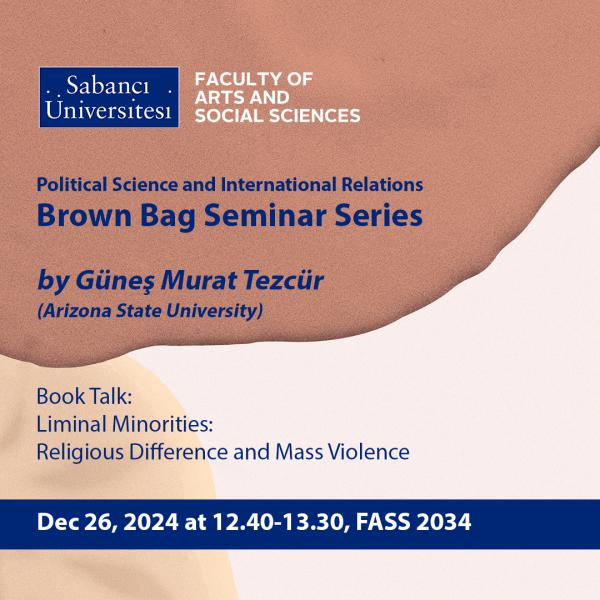Brown Bag Seminar by Güneş Murat Tezcür (Arizona State University)

Gunes Murat Tezcur (Arizona State University: Güneş Murat Tezcür (Ph.D., University of Michigan, 2005) is the Director of the School of Politics and Global Studies (SPGS) at the Arizona State University. He leads SPGS with its PhD program in Political Science, five MA programs, more than 50 faculty members and 17 staff, and over 2,000 students in one of the largest and most innovative and inclusive public research universities in the U.S. Güneş authored 35 scholarly articles and book chapters and two books as well as editing three books. His newest book is Liminal Minorities: Religion and Mass Violence in Muslim Societies (Cornell University Press, 2024). He is also the editor of The Oxford Handbook of Turkish Politics (Oxford University Press, 2022).
Why do some religious minorities, lacking any significant power and presenting no imminent threat, provoke the ire of popular groups and become targets of violent attacks? Liminal Minorities (Cornell University Press, 2024) addresses this puzzle and offers the comparative-historical study of mass atrocities targeting certain religious minorities. It argues that these faith groups, defined as liminal minorities, are stigmatized across generations, as they lack theological recognition and social acceptance from a dominant religious group. Stigmatization originates from religious differences, gains multiple layers over time, and directly informs popular portrayals of liminal minorities as treacherous political groups. Liminal minorities are especially vulnerable to violent attacks during periods of political change generating resentment among members of a majority group. Under conditions of a weakened and fragmented state authority, this group directs its anger toward a liminal minority that makes a convenient scapegoat. The combination of hatred based on religious stigmas and political resentment becomes the spark leading to mass violence. The book elucidates the dynamics of anti-Yezidi genocidal attacks in northern Iraq in the 2010s and anti-Alevi massacres in Turkey in the 1970s and 1990s. It utilizes a rich variety of original sources, including in-depth interviews with survivors, field trips, and court documents.